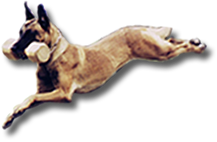The last day of the seminar there was again a miscommunication regarding who was to come and pick us up from the hotel, and we arrived about 20 minutes late. Once we arrived, there was coffee waiting, and we began with Shawn doing some lecture in obedience theory. With the language barrier, it is very hard to discuss the nuances of obedience, so we did a rough outline in lecture, and then came out to the training area to show them the ideas.
Shawn took a few of the dogs, and demonstrated the procedure for using the Jute roll in obedience, and how to develop attention in heeling. We also demonstrated how to use food. Both the food reward and toy reward methods were well received, and it struck us how different the US is from the rest of the world when it comes to using reward in obedience for police dogs. In my travels all across Europe, almost all trainers, be they in ring sports, IPO, SVV or Police use a reward method to, at a minimum, teach new behaviors in obedience.
The Argentinian handlers and trainers go even further, using an instrumental method, where by the dogs are first taught “concepts” of following, left, right, up down, etc. and then these concepts are used to develop actual behaviors using a clicker training method. The dogs are expected to work around their rewards (toys, decoys) and are sent to the rewards for a successful chain of behaviors. We spent a fair bit of time having the spanish translated to Portuguese, and back to English, so it is amazing that we were able to understand what the trainers were saying about the methodology thyey used.
The last part of the morning was spent with Jerry explaining the method for using the e-collar. Everyone was very interested, as there seems to be very little information available in Brazil for good E-Collar methodology. The class was very interested to see how we used the e-collar in heeling, recalls, outs, redirects and call-offs, and to learn both the advantages and limitations that had to be considered with this tool when training police dogs.
The lunch break was called, and for the third day we went to the cantina in Sao Paulo. Upon our return, some photos were taken, gifts exchanged, and contact information was exchanged. Many of the participants expressed a heartfelt thanks for us coming to share our experiences and methods with them. In return we expressed our gratitude for the invitation and thanks for their attention and good questions.
We went on to bitework, and showed some techniques for building and improving bite quality in some of the younger dogs. As a rule they move to far too fast, and don;t take enough time to develop drive channelling so when the dogs work in prey they are very impressive, but when defense is brought the dogs have a hard time staying committed and even engaged, so we showed them techniques to slowly step-by-step build the dog’s confidence when working in defense.
To end the afternoon session (we decided to call the end at 4pm as many had to travel from very far away) we set up a tactical building search exercise to clear a room with a 3 man team. We showed them how to position the dog handler, how to take consideration of cover, and manage the suspect once extracted. We set the extraction up so the dog would ebter through a window, and we did the extraction exercise a couple of times. The Argentinian dog did beautifully. The team did a nice job of maintaining proper position, and doing a tactical removal once the suspect was to a previously cleared position. The participants seemed to enjoy this application, and were very interested in the method.
What ensued next was a discussion of arrest techniques using a K9 and a cover officer, and we showed the procedures we teach fr avoiding cross-fire, and for using the dog to impress the subject. These were no bite scenarios of arrest. We then began discussing various other tactics, until we called the seminar over. Everyone was very interestyed in what we do and why.
The last part of the afternoon was spent handing out certificates and taking a lot of pictures with everyone at the seminar. In 3 days we made some new friends, and even with the language barriers managed to make some jokes that will be remembered. As I travel to ever more places, it strikes me that people do live somewhat differently, but on the whole, it always impresses me how similarly we all live. Despite what you hear on the news in America, people look to America as the example of what prosperity can bring when people are left to their own abilities. They always ask us how we live, what we eat, what our daily routines are like, what cars we drive, and unlike what you may hear in the media, we are still the example of what is posssibe. I think when people have a chance to meet as individuals there is a big difference, as everyone sees how alike they really are at the core.
Even more Pics are up on Photobucket……..

